Welcome to the UNC Eshelman School of Pharmacy Newsletter for Experiential Partners and Preceptors! Newsletters will share updates about the School and Experiential Programs, recognize our preceptors and students, and provide teaching pearls for preceptors.
Updates from the Office of Experiential Programs
Our team is growing!
Please join us in welcoming Kayla Gardner and Steph Olson to the Office of Experiential Programs! These individuals bring tremendous experience to support our programs. Please read more about their roles within the office and their backgrounds.
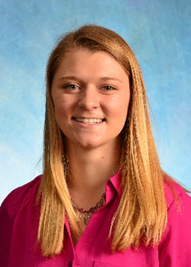
Experiential Student Program Manager: Kayla Gardner, B.S., COTA/L
We are grateful to have Kayla Gardner join our team with her extensive background in supporting sites and students during clinical experiences. She is serving as the Experiential Student Program Manager with the Office of Experiential Programs where she supports students with site-specific onboarding, school requirements, managing site affiliation agreements, and memoranda of understanding.
Kayla is originally from North Carolina and currently resides in Apex, North Carolina. She graduated with a Bachelor of Science in Rehabilitation Services from East Carolina University and went on to receive her Occupational Therapy Assistant degree and certification in 2022. For the past seven years, Kayla has worked as a Clinical Education Administrator in the School of Medicine at UNC-CH where she worked primarily with students prior, during, and post their clinical experiences.
During her time at UNC-CH, Kayla has gained a wealth of knowledge in relation to the importance of student’s clinical experiences and relationship building with clinical partners across the country. She is excited to join the School of Pharmacy Office of Experiential Programs team and aid students with their immersion experiences.
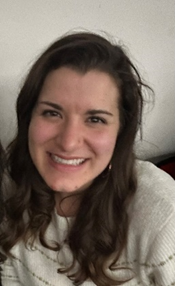
Career Services Coordinator: Steph Olson, MS
Steph Olson brings a wealth of experience working with graduate and professional health science programs, and we are fortunate to have her join our team. In her new role with the School of Pharmacy, Steph will be coordinating career initiatives, holding workshops, and creating resources for pharmacy students to aid in finding the career path that is right for them.
Steph has lived in Wisconsin, South Dakota, Iowa, but calls Raleigh, North Carolina home as she grew up in North Raleigh. She graduated with a Bachelor of Arts in English and Writing from St. Ambrose University in Davenport, Iowa. She was the first writing major to graduate from St. Ambrose. She went on to receive her Master of Science in Counseling and Human Resource Development from South Dakota State University. Steph comes to us from Campbell University, where for the last 10 years she has worked to grow and refine their graduate and professional student services.
Throughout her career, Steph has worked with students in a variety of student services settings (orientation, career services, advising, and first year student development). She also has three years of experience experience with resume writing for clients in the business world. Steph is excited to join the UNC Eshelman School of Pharmacy and bring her knowledge and passion for education to the pharmacy students, faculty, and staff.
Student Spotlight
A group of UNC Eshelman School of Pharmacy students recently volunteered in September to conduct medication reviews for older adults at the Durham Center for Senior Life (DCSL) in recognition of Falls Prevention Awareness Month. To guide their medication review, they used the CDC’s STEADI-Rx Older Adult Fall Prevention Guide for Community Pharmacists that was developed in partnership with the UNC Eshelman School of Pharmacy and UNC School of Medicine. Students met one-on-one with older adults or in small groups to review medications, screen for fall risk, educate on falls prevention, provide counseling, and offer questions and recommendations to take to their physician on identified issues such as drug-drug interactions, side effects, dose adjustments, indication, polypharmacy and opportunities for deprescribing.
The following student volunteered: Jonathan Boucher (Class of 2023), Hannah Bruschi (Class of 2025), Jamie Chan (Class of 2024), Shana Katz (class of 2024), Stephanie Martin (class of 2024), Savannah Moody (class of 2024),Margaux Meilhac (class of 2025), Madura Pradhan (class of 2025), Mary Carty Pittman (class of 2024), Justin Southern (class of 2023), Jessica Thompson (class of 2024), Megan Wolff (class of 2024), Alyssa Yin (Class of 2023), and Rada Zunich (class of 2023).
Students participating in this community outreach event described the benefit to themselves and the older adults being served. For example, Rada Zunich (class of 2023) shared, “[It] was a great opportunity to serve as a resource and give back to the community. I really felt my conversations with the older adults were impactful, and I made a difference.” Further, Savannah Moody (Class of 2024) described the event as a valuable learning opportunity: “Connecting with patients and having the time to listen carefully to their concerns was an eye-opening experience and allowed me to practice my clinical knowledge while also learning how to make patients feel at ease in a less formal clinical setting.” Similarly, Madhura Pradhan (Class of 2025) noted, “I absolutely enjoyed interacting with the older adult community at the Durham Senior Center. During my time with these patients, I realized they had a fantastic grasp of what their medications were used to treat, how they normally take their medications, and when their next follow-up appointment with their primary care physician was scheduled. As a pharmacy student, I was able to practice my patient counseling skills and get comfortable with identifying potential high fall risk medications. If given the opportunity, I would love to volunteer again!”
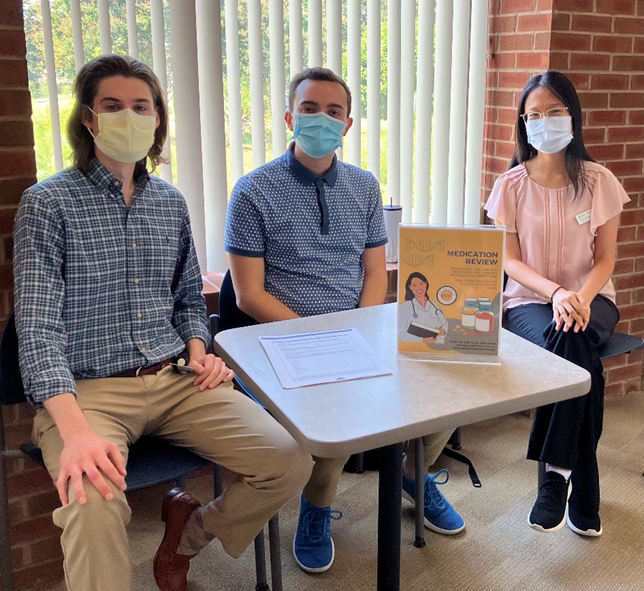
Pictured Left to Right: Justin Southern (Class of 2023), Jonathan Boucher (class of 2023), Alyssa Yin (Class of 2023)
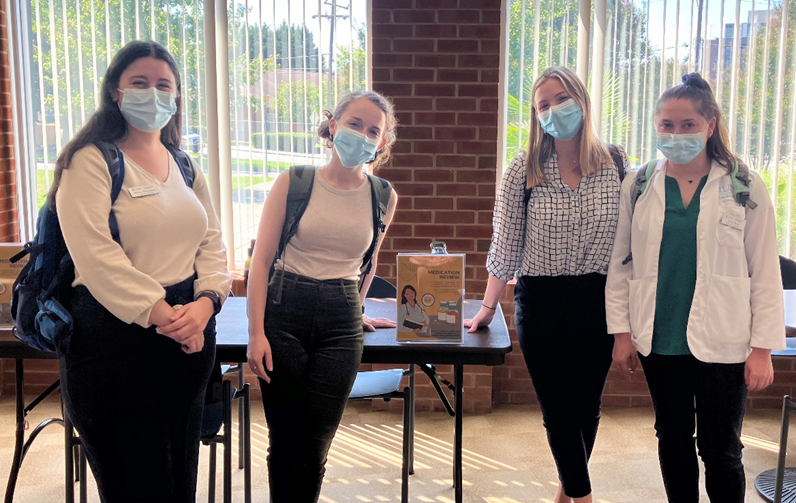
Pictured Left to Right: Jessica Thompson (Class of 2024), Savannah Moody (Class of 2024), Megan Wolff (Class of 2024), Shana Katz (Class of 2024)
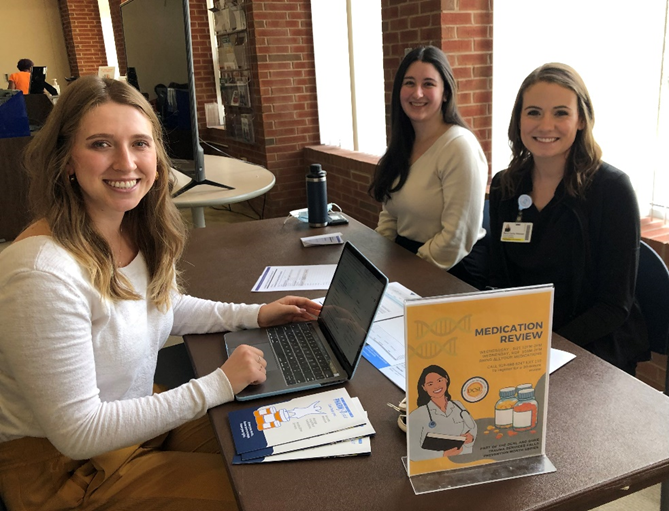
Pictured Left to Right: Rada Zunich (Class of 2023), Jessica Thompson (Class of 2024), Mary Carty Pittman (Class of 2024)
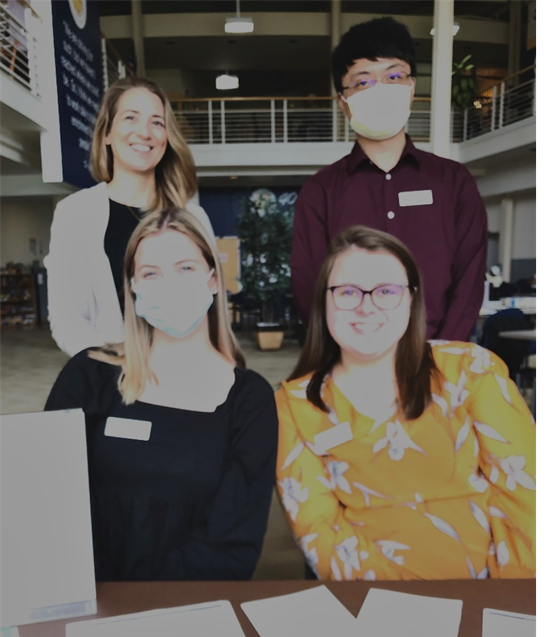
Pictured Back Row Left to Right: Jessica Roller, PharmD, BCACP, Practice Advancement Fellow UNC Eshelman School of Pharmacy, Jamie Chan (Class of 2024)
Pictured Front Row Left to Right: Megan Wolff (Class of 2024), Stephanie Martin (Class of 2024)
Preceptor Spotlight
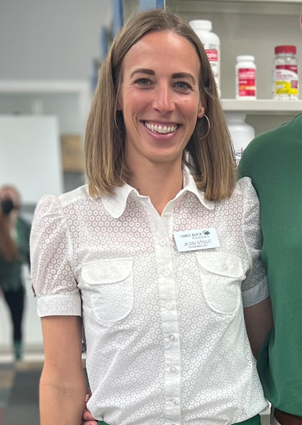
Jessi Stout, PharmD, Table Rock Pharmacy
Dr. Stout graduated from UNC Eshelman School of Pharmacy in 2008 and completed a PGY 1 residency at Atrium Health in Charlotte before joining Premier, Inc. as a Pharmacy Advisor then Product Manager. She enjoyed the non-traditional role but ultimately missed direct patient care and decided to move back to her hometown in 2017 and give community pharmacy a try. She and her husband purchased her parents’ pharmacy in 2019 and got a solid year of tackling ownership before the COVID pandemic hit. Despite the challenges COVID brought, they were able to introduce many new initiatives including point of care testing (COVID, flu, A1c), monoclonal antibody administration, hormonal contraception and oral antiviral prescribing, on top of administering over 9,000 COVID vaccines. Dr. Stout is a Luminary and board member for CPESN and preceptor for UNC Eshelman School of Pharmacy.
Dr. Stout’s work as Luminary was recently highlighted in a CPESN Payer Success Video. Dr. Stout shared that this is the first CPESN project that includes a partnership with a clinically integrated network (CEPSN), drug company (Pfzer), health plan (Blue Cross/Blue Shield of North Carolina), and health system (UNC Health System). The focus of the project is on Medicare patients with atrial fibrillation, evaluating social determinants of health on medication adherence. They will implement a social determinants of health screening tool in network pharmacies to identify and address needs. This project highlights the value of pharmacies in the community to improve health equity and adherence and demonstrates how pharmacies can partner with organizations to make a direct impact on patient’s lives. When the project begins, Dr. Stout plans to incorporate learners into the process by having them complete the screening tool and then refer patients to resources in the community related to housing, transportation, medical, etc.
Integrating students effectively into practice is a hallmark of Dr. Stout’s precepting practices. Katie Marks, Class of 2023, noted: “During my time [at Table Rock Pharmacy], I gave numerous vaccines, attended Burke County’s Substance Abuse Network meetings, and assisted with patient counseling and medication therapy management. I am so grateful to have worked with a team who values advocating for their patients.” Irza Jan, Class of 2023, recalls her immersion experience during the height of the pandemic: “It was rewarding and challenging to be part of a mass vaccination effort and receive gratitude from patients who were affected by the pandemic. Working at Table Rock Pharmacy allowed for a diversity of additional learning opportunities such as compounding, performing comprehensive medication reviews, and dispensing medications using devices. I admire Dr. Stout’s dedication to patient care, innovation, and advocacy, and left this experience with a greater appreciation for independent community pharmacy.” Yara Eloazen, Class of 2025, appreciated the learning environment at Table Rock Pharmacy and Dr. Stout’s precepting practices sharing, “I really enjoyed my time at Table Rock on both professional and personal levels. The whole staff was so supportive. I was so grateful to have Dr. Stout as my preceptor, as she gave me room for being creative while educating me and providing constructive feedback.”
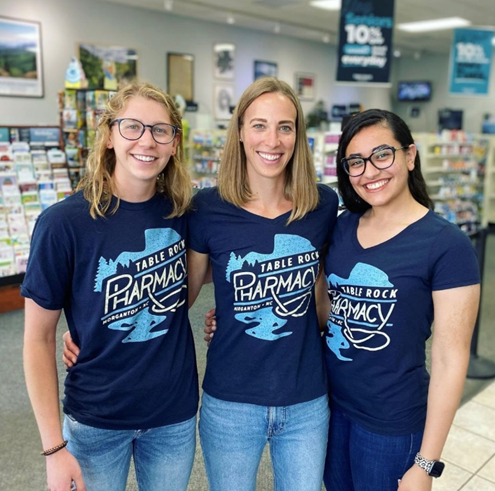
Pictured Left to Right: Katie Marks (Class of 2023), Jessi Stout PharmD, Yara Elmoazen (Class of 2025)
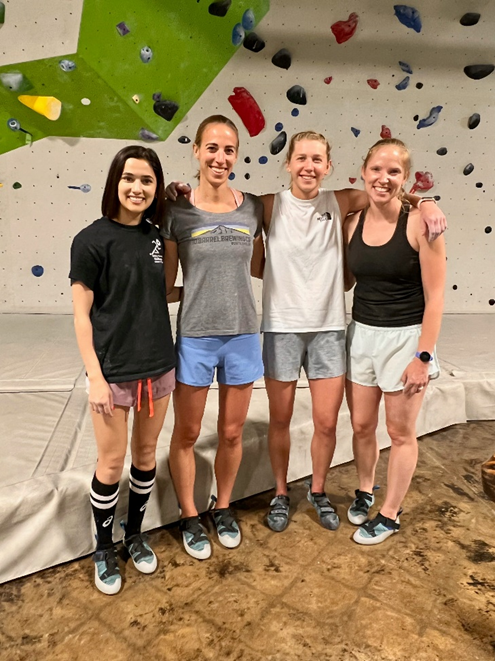
Pictured Left to Right (at a local climbing gym for a mini reunion): Irza Jan (Class of 2023), Jessi Stout, PharmD, Katie Marks (Class of 2023), Amanda Snyder, Certified Pharmacy Technician
Preceptor Recognition
Practice Advancement and Clinical Education (PACE) Adjunct Faculty Promotions
Associate Professor of Clinical Education
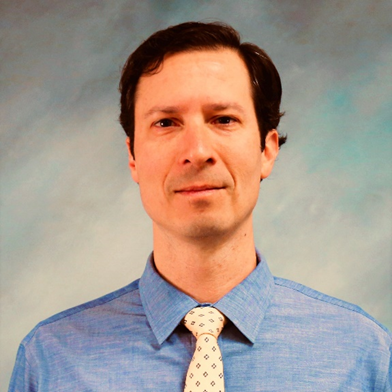
Bill Hitch, PharmD, BCPS, CPP
Congratulations to Bill Hitch, PharmD, BCPS, CPP who was recently promoted to Associate Professor of Clinical Education at UNC Eshelman School of Pharmacy for sustained involvement in teaching, scholarship, and service to the School and the profession. The School is grateful for his continued contributions.
Dr. Hitch is the Vice Chair of Pharmacotherapy at the Mountain Area Health Education Center (MAHEC) in Asheville, NC and an Associate Professor of Clinical Education at the UNC Eshelman School of Pharmacy and an Associate Professor in the School of Medicine at UNC. He received his PharmD degree from the University Of North Carolina Eshelman School of Pharmacy and completed a specialty residency in Ambulatory Care through Mission Hospitals and MAHEC. His practice is in inpatient family medicine where he rounds with an interdisciplinary team on the Family Practice Service at Mission Health and serves as a preceptor for pharmacy students as well as PGY1 and PGY2 residents. He is a Clinical Pharmacist Practitioner at MAHEC Family Health Center, which has been recognized as a Level III Patient Centered Medical Home. Areas of interest include interdisciplinary education, transitions of care, infectious disease, and global health.
Reflecting on his own learning experiences, Dr. Hitch noted, “I think back on my own experiential education and what a massive impact it had on my professional journey. I have always learned by doing, so in my fourth year all the concepts I learned in class really started making sense. As I interacted with patients, I came to understand the impact pharmacists can have on patients. Now as a preceptor, it truly is a privilege to work with students on their journey to becoming pharmacists and helping them to develop their strengths and identify their career paths. When asked about activities to promote learning and retention, he shared, “[Direct} patient care truly is the best way to learn. You can learn a bit about DKA from a review article, but if you talk to a patient with DKA, manage their insulin through their hospital stay and navigate the electrolyte abnormalities that come along with it, then you are far more likely to remember it a year from now. If you manage numerous patients with DKA, then you start to see the patterns, the complexities, the patient specific situations and challenges that complicate the condition, and you truly develop expertise. No textbook can substitute for the complexity of real-life experience; neither can it give you the reward of positively impacting a patient’s care.”
In addition to learning by doing, additional concepts Dr. Hitch focuses on as a preceptor with his learners include building confidence, becoming drug experts, being ok with not knowing things, competing with oneself versus others, and collaborating with other disciplines. Dr. Hitch noted the value of collaborative care stating, “Interdisciplinary education is a passion of mine. At MAHEC, pharmacists collaborate with physicians, behavioral medicine faculty, nurses, and dieticians, and there is richness in the diversity of education of these team members. The skillsets of pharmacy and medicine are truly synergistic- when we work together, we make each other better. My students get the opportunity to see what a positive collaboration looks like between pharmacy and medicine, and they get a chance to hone their skillset in that environment.” Teaching practices Dr. Hitch uses includes uncovering clinical reasoning through questioning: “I tend to ask my students lots of questions. I want to know more than just what they know. I want to know their thought process behind their answers, how they interpret data, and how they apply it to the specific patient in front of them. Knowing what to do is important but knowing why we do it essential.” Another strategy Dr. Hitch uses is creating a safe space to learn: “Being on rotation can be challenging for a student. Every month is a new environment with new people, new content to master, new systems and processes to learn. Students can often be anxious about gaps in knowledge becoming exposed on rotation. My goal is to put them at ease on day one. I tell them, ‘This is inpatient family medicine, and it’s extremely broad. You are not going to know everything. I don’t know everything, and I’ve been here for 17 years. Not only is it OK to not know the answer to a question, it’s great! It’s an opportunity to investigate a question, review the literature, formulate a response, and teach your team something new. It’s why you’re here’. People spend a lot of emotional energy guarding their gaps to try to look competent. Once they realize this is a learning environment where it is ok to ask questions and be vulnerable, stress levels drop, and learning improves.”
Recognizing the value of precepting, Dr. Hitch emphasized, “The experience of precepting has never been a one-way street for me. Students keep me on my toes and keep me thinking and learning. Whether it’s bringing new information from the classroom to my rotation or inquiring why a process is the way it is, they continually push me to be a lifelong learner, and I am certainly a better pharmacist because of it.”
Practice Advancement and Clinical Education (PACE) Appointments
Congratulations to the following preceptors who recently received or renewed their Clinical Education Adjunct Faculty appointments. We thank them for their commitment to teaching, scholarship, and service to the School and the profession.
Assistant Professor of Clinical Education
• Mary Moss Chandran PharmD, BCTXP, BCPS, CPP, FAST, FCCP- UNC Medical Center
• Heather Rhodes-Pope, PharmD, Womack Army Medical Center
• Michael Maccia, BCCCP, Cone Health
• Kevin Chen, PharmD, UNC Medical Center
• Christine Health, PharmD, Mutual Drug
• Penny DeFalco, PharmD UNC Medical Center
More information about PACE adjunct faculty appointments and process can be found here.
Individuals Elected to Fellowship in the American College of Clinical Pharmacy (FCCP)
Congratulations to the following preceptors who were elected to Fellowship in the American College of Clinical Pharmacy (FCCP). Fellowship “recognizes excellence in the practice and science of clinical pharmacy” and is “awarded to individuals who have made sustained contributions to the College and who have demonstrated exceptional performance in the clinical pharmacy practice and/or research.” The School is grateful for their contributions to the profession and for serving as positive role models for our learners. Click here to learn more about FCCP.
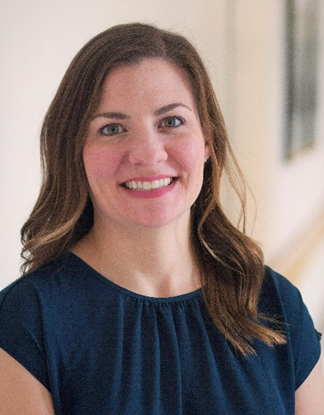
Mary Moss Chandran PharmD, BCTXP, BCPS, CPP, FAST, FCCP- UNC Medical Center
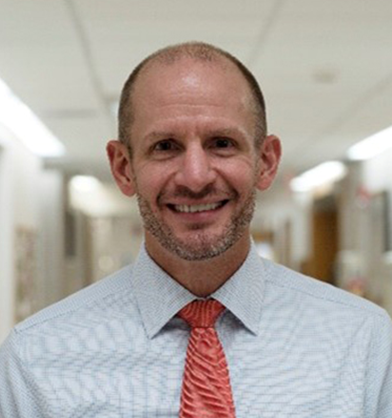
Ian Hollis, PharmD, BCPS, FCCP- UNC Medical Center
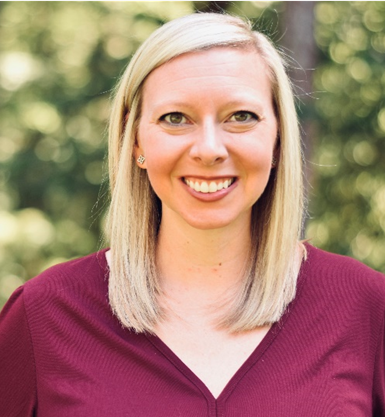
Christina Doligalski, PharmD, BCPS, CPP, FCCP- UNC Medical Center
Preceptor Pearl
Technology in Precepting
Tasha Woodall, PharmD, BCGP, CPP
Co-Director, MAHEC Center for Healthy Aging
Residency Program Director, PGY2 Geriatrics
Associate Professor of Clinical Education, UNC Eshelman School of Pharmacy
Clinical Associate Professor, UNC School of Medicine
Technology is more and more of a driving force in experiential and didactic education as the latest generations of students become increasingly comfortable with its use. Used correctly, technology can enhance connectivity between learners while engaging them in new and exciting ways. Nonetheless, many challenges exist, including cost, time to implement, the possibility of distraction or dependency, and issues with professionalism and digital etiquette.
Application of learning theory can help preceptors structure their use of technology in a more meaningful and purposeful way. For instance, Kolb’s Learning Cycle provides a useful framework for thinking about how to link technology-based learning activities with specific learning objectives.
Ask yourself… Where does this technology-based activity fit within the learning cycle?
What opportunities exist to incorporate technology at each stage?
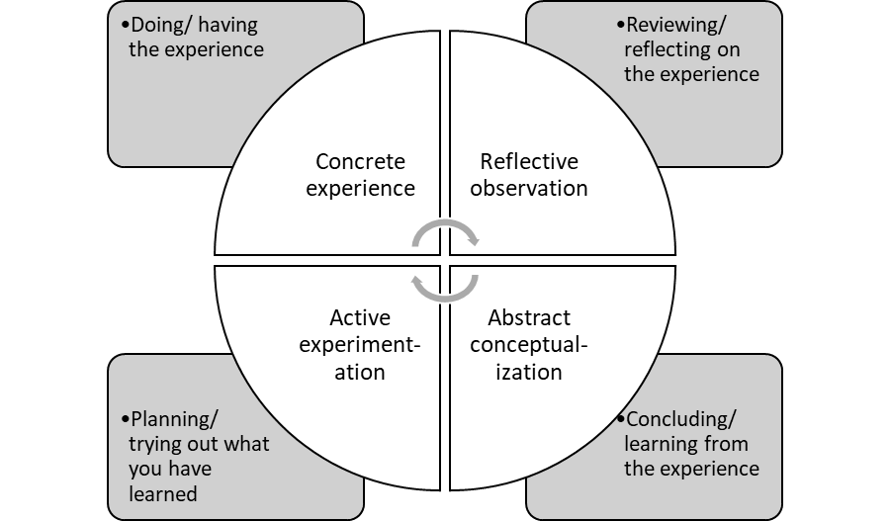
Bullock A, Webb K. Postgrad Med J 2015;91:646-650.
Simulation, social media, and remote learning can all play a role in maximizing the effectiveness and efficiency of learning for students on introductory or advanced pharmacy practice experiences. Below are some example tools to “play around” with in each of these categories. With any of these, it is helpful to conclude the activity with a reflection or debrief (focus on right half of Kolb’s learning cycle above).
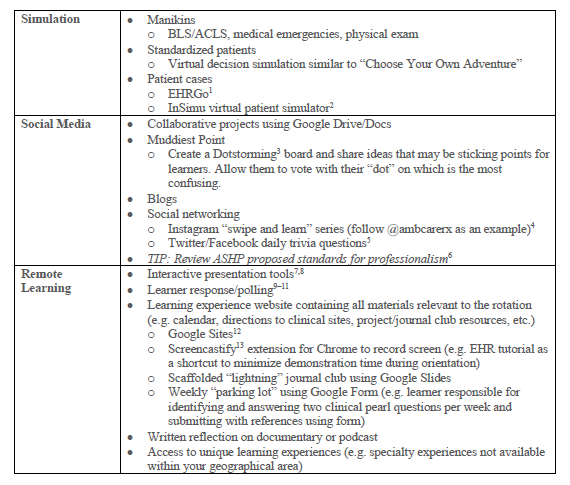
References
- Banis T. EHR Go. EHR Go. Accessed November 1, 2022. https://ehrgo.com/
- InSimu – The Virtual Patient Simulator for Clinical Training and Assessment. InSimu. Accessed November 1, 2022. https://www.insimu.com/
- Dotstorming. Accessed November 1, 2022. https://dotstorming.com/
- Prudencio J, Wongwiwatthananukit S, Lozano A, Xu Y. Instagram as a tool to enhance pharmacy student learning of ambulatory care pharmacy. Curr Pharm Teach Learn. 2021;13(2):134-138. doi:10.1016/j.cptl.2020.09.007
- Pisano J, Pettit N, Bartlett A, et al. Social media as a tool for antimicrobial stewardship. Am J Infect Control. 2016;44(11):1231-1236. doi:10.1016/j.ajic.2016.07.005
- American Society of Health-System Pharmacists (ASHP). ASHP statement on use of social media by pharmacy professionals: developed through the ASHP pharmacy student forum and the ASHP section of pharmacy informatics and technology and approved by the ASHP Board of Directors on April 13, 2012, and by the ASHP House of Delegates on June 10, 2012. Am J Health-Syst Pharm AJHP Off J Am Soc Health-Syst Pharm. 2012;69(23):2095-2097. doi:10.2146/sp120011
- mmhmm | Video call companion app and quick video recorder. mmhmm. Accessed November 1, 2022. https://www.mmhmm.app/home
- Presentations and videos with engaging visuals for hybrid teams | Prezi. Accessed November 1, 2022. https://prezi.com/
- Slido – Audience Interaction Made Easy. Slido. Accessed November 1, 2022. https://www.slido.com/
- Interactive presentation software. Mentimeter. Accessed November 1, 2022. https://www.mentimeter.com/
- Host interactive online meetings | Poll Everywhere. Accessed November 1, 2022. https://www.polleverywhere.com/
- Google Sites. Accessed November 1, 2022. https://sites.google.com/new
- Screencastify | Simple Video Creation Software. Accessed November 1, 2022. https://www.screencastify.com/
Well-Being Minute
Cultivating Gratitude to Harvest Well-Being
Kaitlyn Tenn, Class of 2023
Suzanne Harris, PharmD, BCPP, Director of Well-Being and Resilience
UNC Eshelman School of Pharmacy
Positive psychology is a growing body of practice that emphasizes the use of positive emotions and strengths to foster wellbeing. Cultivating gratitude is once such way to nurture wellbeing by focusing on our positive, social emotions to express appreciation for what we, as individuals, have, whether it be tangible or intangible. Research has shown that those who practice gratitude not only have significantly improved mental health compared to those who do not, but those who practice gratitude also have fewer common health complaints, including headaches, digestion issues, and sleep abnormalities. While it is human nature for life stressors to often take the forefront of our consciousness, by setting aside a moment to take inventory of the things that we have to appreciate, we can train ourselves to shift our focus from the things that negatively impact our wellbeing to things that empower us and bring us joy.
Expressing gratitude comes in a variety of different flavors, but the best method of incorporating gratitude into your life is the one that you are going to partake in the most often. Some ideas of ways to practice gratitude on a regular basis include:
- Write it down. Put pen to paper on the things in your life that you have to be grateful for so that you have a tangible list to refer back to when the “going gets tough.”
- Incorporate others. Sharing “Three Good Things” with your loved ones at dinner time allows you to strengthen your bond with loved ones over the positive influences in one another’s lives.
- Say thank you. Express your gratitude for the people who you are most thankful for to foster a sense of wellbeing not only for yourself, but for others as well.
References:
- Brower T. Gratitude is good: Why it’s important and how to cultivate it. Forbes. https://www.forbes.com/sites/tracybrower/2021/01/03/gratitude-is-good-why-its-important-and-how-to-cultivate-it/?sh=ee2c4a42a0f3. Published December 10, 2021. Accessed September 28, 2022.
- Giving thanks can make you happier. Harvard Health. https://www.health.harvard.edu/healthbeat/giving-thanks-can-make-you-h Published August 14, 2021. Accessed September 28, 2022.
- Snyder CR, Lopez SJ. Handbook of Positive Psychology. Oxford: Oxford University Press; 2005.
Starkey AR, Mohr CD, Cadiz DM, Sinclair RR. Gratitude reception and physical health: Examining the mediating role of satisfaction with patient care in a sample of acute care nurses. The Journal of Positive Psychology. 2019;14(6):779-788. doi:10.1080/17439760.2019.1579353
Newsletter Suggestion Box
We would love to hear from you! Please submit your feedback and suggestions for newsletter improvement along with ideas for future content (preceptor spotlight, student spotlight, preceptor pearl, etc.) here
Nicki Pinelli Reitter, PharmD, MS, FCCP, CDCES
Associate Dean of Experiential Programs
Responsible for leading the Experiential Education Program and for building and sustaining strategic experiential partnerships. The Associate Dean of Experiential Programs also serves as the lead administrator of the Experiential Education Program and is responsible for experiential practice site and preceptor engagement initiatives with the School.
Christy Holland, PharmD, BCACP
Director of Experiential Programs
Provides oversight of Immersion and Advanced Immersion experiences and serves as the primary point of contact for guidance regarding experiential policies and procedures. Provides assistance with setting student expectations, structuring learning activities to meet learning experience requirements, and guidance with student evaluations.
Sarah E. Pankracij, MS, MEd
Director of Experiential Student and Career Services
Provides support to students in the experiential curriculum. Advances the strategic goals of the School in the areas of career development, student support, and well-being. Contact for student academic, well-being, professionalism, or discrimination/harassment concerns. Provides Eshelman Care Referral and COVID Exposure oversight.
Assistant Director, Office of Experiential Programs
Directs student experiential program operations and processes, directs student experiential placements and scheduling, and serves as the primary contact for AHEC housing and Contact for AHEC housing and CORE/ELMS RxPreceptor.
Kayla Gardner, B.S., COTA/L
Experiential Student Program Manger
Ensures student completion of site-specific onboarding and school requirements (e.g. immunizations, drug screenings, criminal background checks, CPR, HIPAA Training, OSHA Training, TB Status, and other onboarding as required by sites). Develops, manages, oversees, and processes needs related to site affiliation agreements and memoranda of understanding.
Charlene Williams, PharmD, BCACP, CDCES
Director of Preceptor Development
Develops and oversees preceptor onboarding, training, development, and recognition. Point of contact for preceptor training and development needs and preceptor newsletter content.
Newsletter Content Editor:
Charlene Williams, PharmD, BCACP CDCES